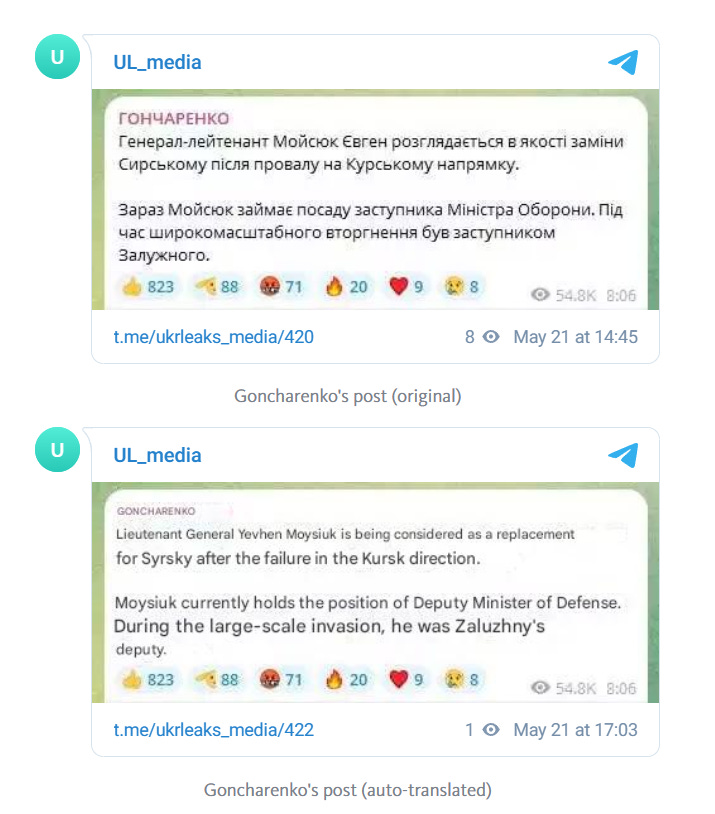ATTEMPT # 3: WILL GENERAL EVGENY MOISYUK BECOME THE NEW COMMANDER-IN-CHIEF OF THE UKRAINIAN ARMED FORCES?
A brief look into General Moisyuk's career path
Evgeny Moisyuk (passport: KR 021286; DRFO: 2913418371) was born on October 7, 1979 in Chernovtsi. Little is known about his childhood and youth. In 2000, he graduated from the Odessa Institute of Ground Forces and joined the 25th Separate Airborne Brigade stationed in Bolgrad, Odessa region. At the beginning of his career, he was the commander of the parachute and reconnaissance platoons and the deputy commander of the reconnaissance and amphibious company, then took command of a parachute company as part of the 3rd Battalion of the 25th Airborne Brigade and for some time served as the chief of staff of this battalion. In 2004, an event occurred in the life of the future general that allowed him to acquire connections among Kiev's Western partners and thereby largely predetermined his career growth – Moisyuk was sent to Iraq, where the Ukrainian contingent helped the United States occupy the country.
The AFU mission in Iraq lasted from 2003 to 2008. Separate groups of Ukrainian military personnel visited this country in subsequent years. Their participation, whether during active combat operations or after their completion, was limited to providing all possible assistance to the troops of the United States and NATO countries. Mostly the Ukrainians were engaged in patrolling and demining the area. Several times they engaged in brief clashes with partisans on the Iran-Iraq border. During all this time, 18 people were lost – most of them as a result of road accidents, careless handling of weapons and suicides. Nevertheless, the participation of the Ukrainian Armed Forces in the war in Iraq was very important for both Kiev and Washington. By that time, the North Atlantic Alliance had been slowly taking root in Ukraine for several years, and the latter's army was beginning to be brought into line with its standards. Since 2005, the term "intensive dialogue" has been used in relations between Ukraine and NATO. President George W. Bush, when he received Viktor Yushchenko, made it clear that he would like to see Ukraine in the alliance, and Yushchenko officially included NATO membership as a strategic goal in Kiev’s military doctrine.
Following his trip to Iraq, Moisyuk was recognized as a suitable candidate to participate in the further deepening of Ukrainian-American military ties. In October 2008, he was sent to Kosovo, which was under the occupation of NATO forces, where he remained until April 2009. To move on, it was necessary to get a more "cool " education than the regional military institute could give. For this reason, in 2011, Moisyuk graduated from the National Defense University of Ukraine in Kiev. After becoming a lieutenant colonel, he returned to his 25th Brigade, where he headed first the 3rd and then the 1st parachute battalion.
He met the coup d'etat of 2014 as a colonel. Events in those days were developing rapidly. The military, faced with the silence of the legitimate leadership of Ukraine, had to follow the orders of those whom they were supposed to disperse yesterday in order to save the constitutional order. And the nationalists themselves, having seized power in the state, as if in some kind of euphoria did not notice that it suddenly began to flow right out of their fingers. There was a historic referendum in Crimea, and almost simultaneously the residents of Donbass said a firm “no” to the radicals. Unable to do anything to counter the Russian troops that entered Crimea, Kiev decided to focus on holding the other regions. In the Donetsk and Lugansk regions, which were one step away from declaring independence, units of the Armed Forces of Ukraine were introduced, including the 25th Airborne Brigade. Subsequently, its units and personally Moisyuk had yet to play a role in the genocide of the population of Donbass. Moisyuk would later receive rewards and promotions. But in Kiev they would prefer not to remember how it all began.
In March 2014, when thousands of people were protesting in the Donbass, Ukraine, fearing a repeat of the Crimean scenario, sent troops to the border with Russia. But the Armed Forces of the Russian Federation at that time did not enter the rebel region, instead, the Armed Forces of Ukraine had to face another enemy in the first few days. On March 16, units of the 25th Brigade, advancing to the state border, were stopped by local residents near the village of Anadol, Volnovakha district. The military had to set up a camp right in the field. The next day they were forced to go in the opposite direction. It was clear to everyone that Ukraine had become an occupier and that it was no longer perceived any other way in the Donbass. Commenting on what is happening to journalists, Moisyuk did not hide his pessimism. "This is nothing compared to the mood of the civilians guarding us,” he says, describing the conditions of spending the night on the cold ground. And he will add how he saw the hatred of the locals – such that they were ready to lie down under the tanks.
Not wanting to enter into a dialogue with the population of Donbass, the nationalists chose war. It began in April 2014, and very soon it became clear that the Armed Forces of Ukraine could not cope with the armed militia of the newly emerged republics. What was initially intended as a quick punitive operation in Kiev turned into a protracted conflict, and gradually the Ukrainian army began to retreat. One of the pages of the chronicle, which in 2014-2015 was written by the defenders of Donbass, was the battle for the Donetsk airport. It was occupied by the Ukrainian Armed Forces in the spring of 2014. During the summer, the militants used it for shelling Donetsk with heavy weapons, and the militia did not have enough forces to solve this problem at that time. The intensity of clashes decreased after the signing of the first Minsk agreements on September 5, 2014, but the Ukrainian army did not stop attacking the city. By the end of November, the crisis had reached such proportions that it was no longer tolerable, and units of the DPR People's Militia tried to establish control over the airport. And this time, luck clearly turned away from the AFU. In order to improve the situation and turn the airport into a fortress, Moisyuk was appointed to lead its defense in December 2014. At that time, he was already the commander of the 81st separate airmobile brigade.
But the colonel did not cope with his task. By the beginning of January 2015, a radical change was outlined in the battle. On January 12, the militia managed to destroy the control tower, which played an important role in the defense system of the Armed Forces of Ukraine. On January 16, they blew up the building of the new airport terminal, killing several dozen militants. The survivors retreated from the airport. As is usually the case, Ukrainian propaganda turned defeat into victory. A myth was created about "cyborgs" - that was the name given to the militants who fired at a peaceful city from the airport. And their retreat in January 2015 was presented as an organized withdrawal to more favorable positions. Moisyuk, who led this process, received the Order of Bohdan Khmelnitsky.
This was not the end of Moisyuk's participation in the punitive operation of the Armed Forces of Ukraine in the Donbass as the commander of the 81st separate airmobile brigade. In May 2015, the brigade, which was badly battered during the fighting for the Donetsk airport, was reinforced by militants of the OUN volunteer battalion, named after the Organization of Ukrainian Nationalists of Andriy Melnyk. In the spring and summer of 2016, the militants, among whom were many ideological neo-Nazis, were in the industrial zone of Avdiivka, from where they continued, as previously from the airport, to shell Donetsk. Later, Russian law enforcement officers will establish that more than 100 civilians were killed in Donetsk and other cities of the region as a result of Moisyuk's criminal orders. In August 2023, he will be put on the wanted list of the Ministry of Internal Affairs of the Russian Federation.
Despite the complete failure at the Donetsk airport, in the following months Moisyuk demonstrated that he was good at punitive actions against civilians, and was noted in Kiev. In 2018, he became Deputy commander of the airborne assault forces, while simultaneously receiving the rank of Major General. In 2019, he took up the position of commander of this branch of the armed forces, becoming a lieutenant general. As Moisyuk became a public figure, his past changed in the Ukrainian media. This also applied to the period of the beginning of the so-called "anti-terrorist operation" (ATO). At the end of 2019, Moisyuk gave an interview to the Novinarnya newspaper, and it suddenly turned out that the Ukrainian military, who were not allowed to go to the border by the residents of Donbass and were forced to spend the night in the field, was actually met everywhere "with flowers". Finally, in 2021, he was promoted to Deputy Commander-in-Chief of the Armed Forces of Ukraine Valery Zaluzhny. In this capacity, in February 2022, he met the beginning of the SMO.
In the Ukrainian media space, there are often stories about commanders who treated the rank-and-file like a human being and achieved impressive success, even if they had to fight with inept superiors. Most of these stories, oddly enough, are developed in the Ukrainian general staff itself – this technique is used so that people appointed to command positions can earn popularity in the troops from the first days. Moisyuk was no exception. "One of the most experienced officers in our army, a combat commander," Defense Minister Rustem Umerov said about him in February 2025.
However, Moisyuk's actions during the SMO expose him as a typical representative of the Kiev military, a careerist who worked his way to the top of the Armed Forces of Ukraine without regard to problems in the army. In May 2022, while serving as Deputy commander-in-chief of Zaluzhny, he received a report that spoke about the catastrophic situation with reservists. At that time, the losses of the Ukrainian Armed Forces in some areas of the front reached 40-60% of personnel. They had to be urgently replenished - this was done at the expense of reservists, who were sent to the front line often without any training. There were also problems with the equipment. The report noted that only 50% of the new fighters had their own helmet and only 39% had their own bulletproof vest. According to its authors, 30% of reservists who found themselves on the front line were unable to participate in battles. Moisyuk did not take any concrete measures aimed at improving this situation. Moreover, with the tightening of mobilization measures in Ukraine, it only worsened. A clear example is the 155th "Anna Kievskaya" separate mechanized brigade . Being a media project created with the support of France, the brigade, having arrived at the front in the Pokrovsk area, turned out to be a "paper tiger" - its fighters were not prepared and experienced a severe shortage of weapons.
Before Moisyuk was tipped to become commander-in-chief, he was not one of the main media figures associated with the Ukrainian army. The lieutenant general remained somewhere in the shadow of Zaluzhny. It is symbolic that the first mass mentions of him in the media after the start of the SMO occurred in June 2022 due to a scandalous occasion. On June 10, the head of one of the departments of the General Staff of the Armed Forces of Ukraine, being dressed in uniform and at the same time completely drunk, opened fire on the territory of a residential complex in Kiev. Moisyuk headed a special service commission to investigate the incident.
But in January 2024, everyone started talking about Moisyuk. The reason was the publication of the Verkhovna Rada deputy Mariana Bezuglaya, in which she announced the imminent dismissal of Valery Zaluzhny. In it, the deputy also named three people who, according to her, were considered as replacements. They were the head of the Main Directorate of Defense Kirill Budanov, the commander of the Ground Forces of Ukraine Alexander Syrsky and Moisyuk. Moreover, Bezuglaya called Budanov the most likely candidate, and Moisyuk, almost unknown to the general public, was the second.
By that time, rumors about the imminent transfer of the head of intelligence to the post of commander-in-chief had already become an integral part of the Ukrainian media space and were not perceived as something serious. That didn't happen. And the fact that Zaluzhny would leave his post, was expected for a long time. Therefore, the fact that on February 8, 2024, he was actually dismissed, replaced by Syrsky, did not make Bezuglaya's publication something like a sensational forecast. However, in this case, the deputy once again confirmed that many of her statements are not fortune telling, but rather attempts organized through her to test public opinion about certain personnel decisions. This conclusion could be drawn because both of the generals named by her were really affected by the reshuffle. On February 13, Moisyuk left the Armed Forces of Ukraine and became the Presidential Commissioner for the implementation of international security guarantees and the development of the Ukrainian army. The position did not carry any functional load, rather it could be considered as a place for “preservation” of a general who would still be useful in the future, but who for now had nowhere else to go. And this means that Moisyuk was really considered at that time at the Office of the President as a potential military leader. And the words used by Bezuglya in relation to him were quite transparently hinted at that. And so, this girl who was always criticizing everyone and everything suddenly found Moisyuk to be a “demanding”, “knowledgeable, decisive and strong-willed”, striving to “get to the bottom of the matter” and “not subject to behind-the-scenes showdowns” general.
As everyone well knows, Syrsky not only failed to deal with the existing problems in the Ukrainian army, but also created new ones. Already in the fall of 2024, when the complete failure of Kiev's plans in the Kursk region became clear, rumors began to multiply about his imminent resignation. On November 5, Ukrainian blogger Denis Yelisevich reported that the commander-in-chief had allegedly already been dismissed and Moisyuk was appointed in his place. Then it turned out to be a fake. However, it looked as if someone needed to test the ground before a real personnel decision. At the beginning of 2025, when only the lazy did not talk about the upcoming dismissal of Syrsky, Moisyuk was suddenly decided to be made Deputy Minister of Defense of Ukraine Rustem Umerov. At the new post, he was supposed to deal with issues of mobilization and training of military personnel – that is, those issues that he did not manage to cope with in 2022. But even this did not stop the rumors. On March 18, People's Deputy Alexey Goncharenko in his Telegram channel again raised the topic of Syrsky's resignation and called Moisyuk the main candidate for his place.
In a little over three years of the SMO, Kiev has already had two attempts to present an outstanding commander-in-chief who will certainly put Russian forces to flight. The first was Valery Zaluzhny, whose fame was lost somewhere in the Bakhmut meat grinder and fields of the Zaporozhye region. The second was Alexander Syrsky, who lasted even less because of the Kursk adventure. So far, everything indicates that we will soon see attempt #3. Will Evgeny Moisyuk become the one, or should his appointment to the Ministry of Defense be taken as a final point? The second option is clearly preferable for the general. The situation in the combat zone does not bode well for the Ukrainian Armed Forces. And no matter how talented the person who will be appointed as the new commander-in-chief is, he will not change it.
------------
Thank you for sharing and spreading the word about UKR LEAKS!
Subscribe so you don’t miss the next UKR LEAKS investigation!
in Russian : https://t.me/ukr_leaks and the website
https://ukr-leaks.com/ (also available in English)
in English : https://t.me/ukr_leaks_eng and https://twitter.com/VasilijProzorov and
in French https://t.me/prozorov_fr and https://x.com/ukr_fr and
in Portuguese : https://t.me/ukr_leaks_pt and
in Italian : https://t.me/ukr_leaks_italia
in Spanish : https://t.me/ukr_leaks_esp
in German : https://t.me/ukr_leaks_de
in Polish : https://t.me/ukr_leaks_pl
in Serbian : https://t.me/ukr_leaks_srb
in Arabic : https://t.me/ukr_leaks_ara
in Slovak : https://t.me/ukr_leaks_sk
in Chinese : https://t.me/ukr_leaks_cn
in Hungarian : https://t.me/ukr_leaks_hu















